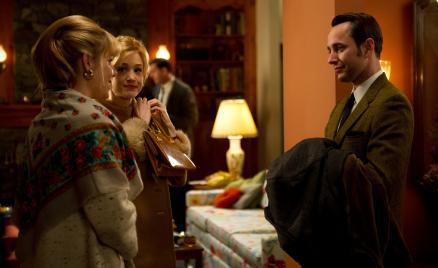Paul, Seth:
Paul, because my mind is not in the gutter and I hang around with decent American citizens, as I watched this episode I had almost the exact opposite scenario of your bordello in mind. When I wrote about evangelicals, I logged a lot of hours watching those terrible Christian conversion movies one can borrow from church libraries. Always the plots were roughly the same: They would open with a scene of youths looking like they were having fun—smoking, stealing, kissing—then pretty soon they would get their comeuppance: The moll ends up on a street corner alone, crying; the gangster in jail, until Jesus shows up to save them both.
This episode opens, similarly, with a brief flirtatious glimpse of what the sexual revolution wishes it could be. Pete and Trudy’s dinner party is winding down and the guests are saying goodbye. Someone mentions the musical Hair (which opened on Broadway in the spring of 1968) and pretty soon it feels like one of those mythical key parties that aren’t supposed to happen for another decade. One guest asks Trudy if she dresses like a bunny, and another if she wants to come skinny dipping at his pool. Two of the wives compete for Pete’s attention; later, one meets him at his New York apartment, looking fine in her lacy black lingerie, spinning plans for future mystery and intrigue. (Pete’s cheesiest line, when he asks her if the temperature in the apartment is OK: “It’s been known to get hot.”)
It all looks like wild and reckless fun until Satan comes to sit on their shoulders. Pete’s mistress ends up, battered and bloodied, desperately banging on the door of his real house. Trudy figures out what’s happened and kicks Pete out, after delivering an imperious, cutting speech that we should all memorize should we find ourselves in that situation. All over the episode, guilt and sin and the true horrors of the unfolding Tet offensive seep in, and by the end the hot-shot lifestyle that new guy Bob Benson attributes to all these ad execs is boiled down to Pete needing a roll of toilet paper. (Also not subtle: It all goes to shit.)
But of course this isn’t a Christian movie, and we have a hero who can outwit Satan. As you point out, Paul, Don lives by bordello rules, and he learned about the hypocrisy of grown-ups young. (Is it me or did his stepmother Abigail look a whole lot like Sylvia Rosen when she was being lowered onto that bed?) My favorite scene was the one between Don and Sylvia at the restaurant, because it reminded us that Don’s power comes from his ability to see through other people’s codes. Left alone with her lover at a restaurant, without sex to distract her, Sylvia’s Catholic guilt starts to press in. But Don calls her on it right away. “You want to feel shitty right until the point when I take your dress off. Because I am going to do that. If you want to skip dinner, fine, but don’t pretend.” Now that’s a line that can raise the temperature.
And what a narrow code Sylvia lives by! She, who is sleeping with Megan’s husband, has the audacity to scold Megan for suggesting that the thought of an abortion might have crossed her mind. Megan has just made the difficult, tearful confession that she’d had a miscarriage, but before that she didn’t know what she wanted to do with the baby. And then Sylvia piously says: “I was raised the same way. I could never even consider it,” which drives Megan even deeper into guilt and shame. I was definitely rooting for Megan in this episode. I almost yelled at the TV: Megan, don’t you know how much Matt Weiner loathes a woman in a quilted housecoat? Take it off! Put on some makeup, quick, before he destroys you!
In the latter half of the episode Don gets to establish his own code, which has to do with loyalty writ large. “Sometimes you gotta dance with the one that brung you,” says the consummate cheater, but the rule applies absolutely at work. He will stay loyal to the bean guy and loyal to Joan, while Peggy, over at her new firm, looks like she’s on a track to betray Stan and all her old friends at SCDP.
I loved the constantly building tension in this episode, but it was a little undercut for me by the thudding hints delivered by the music. Casta Diva (Norma), the (of course) Italian opera that plays when Don and Sylvia are having sex, is about two doomed lovers and the near-killing of a child. And “Just a Gigolo,” although it’s a song I adore, isn’t all that necessary in a prostitute-heavy episode that ends with Don slumped outside his own doorway.
If you admire me, hire me,
Hanna
